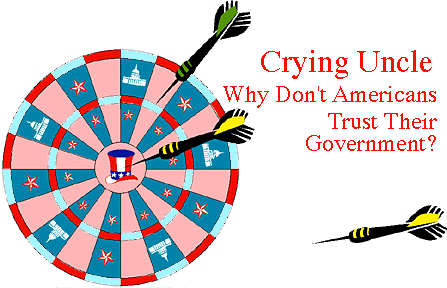
Nita Rinehart was in the hardware store the other day when the cashier recognized her. "I have stopped voting because I don't like politics," the cashier told the state senator from Seattle, "but I will vote for you. I trust you."
Now there's something you don't hear very often: the words "trust" and "politics" in the same sentence. Lately, just about every form of government has been getting ripped more often than Seattle Seahawks owner Ken Behring.
Turn on talk radio, and you'll hear folks ranting at government leaders for not keeping promises about tax cuts or for turning the home remodeling permit process into a living nightmare.
Feelings of frustration seem to be everywhere. Throw-the-bums-out term limit resolutions and Proposition 13-inspired caps on government spending are all the rage. "Outsiders" like Ross Perot and Pat Buchanan are (to some) the new political hopes for the masses. At the extreme, mistrust in the government has led to such nasty incidents as the Oklahoma City federal building bombing, the Branch Davidian siege near Waco, Texas; and the FBI's encirclement of the heavily armed "Freemen" in rural Montana.
"Skepticism of the government is a very good thing," says Walt Williams, a professor of public affairs at the UW and co-founder of the UW's Trust in Government Project. "But now we have an unhealthy paranoia by people who mistrust the government. And that isn't going to cure anything."
Polls Show Extreme Lack of Trust
Mistrust--A Historical Tradition?
How the Information Revolution Feeds Mistrust
Getting Americans to Believe in Their Government
Again
Trust
in Government Project Website
Letters to the Editor About
"Crying Uncle" and Mistrust of Government